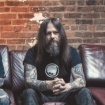This article originally appeared in the December 2008 issue of Decibel magazine and in Revolver's 2009 collector's issue dedicated to Slayer.
After 1985's Hell Awaits, Slayer signed with Def Jam, the rap label founded by Rick Rubin and Russell Simmons. With the flick of a pen, the band's labelmates went from the likes of L.A. sleaze-metal mercenaries Lizzy Borden and Bitch to future hip-hop luminaries LL Cool J and the Beastie Boys. As unlikely as it might have been, Slayer's alliance with Rubin and Def Jam would result in an inimitable thrash trilogy: 1988's South of Heaven, 1990's Seasons in the Abyss and, of course, the album that kicked it all off and is frequently cited as the band's masterpiece, 1986's Reign in Blood.
LARRY CARROLL (ARTIST) I met Rick Rubin in a coffee shop in New York — it must've been 1986. He looked pretty much the same as he does now, with the big beard and everything. I had heard Slayer, because I'm from California, but I'd never seen them. At that time, I was doing a lot of political illustrations for The Progressive, The Village Voice, The New York Times op-ed page, stuff like that. If I remember correctly, the band didn't like the cover I did for Reign in Blood at first. Someone didn't, anyway — I don't remember if it was actually someone in the band or their management. But then someone in the band showed it to their mother, and their mother thought it was disgusting, so they knew they were onto something.
KERRY KING Rubin really cleaned up our sound on that record, which drastically changed what we sounded like and how people perceived us. It was like, Wow — you can hear everything, and those guys aren't just playing fast, those notes are on time. It was what we needed to be. Before that, we were happy to sound like Venom or Mercyful Fate. We played in Reverb Land, for lack of a better term. And the reverb was the first thing Rubin took out. When we heard the mix we were like, "Why didn't we think of that before?"
JEFF HANNEMAN At that time, we always listened to Metallica and Megadeth to see what they were doing, but one thing about me and Kerry is that we get bored of riffs really quick. We can't drag the same thing over and over or do the same verses six times in a song. If we do a verse two or three times, we're already bored with it. So we weren't trying to make the songs shorter — that's just what we were into. When we finished Reign in Blood, we had this meeting with Rubin, and he was like, "Do you realize how short this is?" And we're going, "Oh, fuck ..." And then we all collectively looked at each other and said, "So what?"
KING I thought it was kinda neat that you had the whole record on one side of a cassette. [Laughs] You could listen to it, flip it over, and play it again. We'd never been about putting songs and music on our records that doesn't need to be there. Hour-long records seem to be the trend these days, but you know, you listen, and it's like, "You could lose this part, you could cut this song completely," and make a much more intense record, which is what we're all about.
HANNEMAN I collect medals and other Nazi stuff that my dad got me started on because he gave me all this shit he got off of dead Nazis. I remember stopping someplace where I bought two books on [Nazi "surgeon" Josef] Mengele. I thought, This has gotta be some sick shit. So when it came time to do the record, that stuff was still in my head — that's where the lyrics to "Angel of Death" came from. Next thing I know, we're neo-Nazis.
KING Yeah, "Slayer are Nazis, fascists, communists" — all that fun shit. And of course we got the most flack for it in Germany. I was always like, "Read the lyrics and tell me what's offensive about it. Can you see it as a documentary, or do you think Slayer's preaching fucking World War II?" People get this thought in their heads — especially in Europe — and you'll never talk them out of it.
DAVE LOMBARDO We got dropped by Columbia because of that. I mean, "Auschwitz — the meaning of pain!" Any sympathizers with the Holocaust aren't gonna have any part of it. But they didn't see the deep meaning of it — it's just documented musical awareness. It's not necessarily for it — it's just something that Jeff discovered and wrote a song about.
HANNEMAN It was like, "Oh yeah — we're racists. We've got a Cuban and a Chilean in the band. Get real."
TOM ARAYA That was one thing I never understood. It's not like there's four white guys in the band.
CARROLL I was living in New Jersey in 1986, right around the time Reign in Blood came out, and the kids across the street loved Slayer. They must've been 14, 15 years old, and they had posters of the album cover all over their room. You know, it's a pretty grotesque cover. You see the guy with the bishop's hat? Right by his hand is his dick. No one ever caught that. Now look at the guy next to him — he's got one sticking out, too. So there's two big dicks on the cover, these kids had Slayer posters all over their room — and the best part is that their dad was a minister.
GLEN E. FRIEDMAN (PHOTOGRAPHER) My favorite thing was when Public Enemy sampled "Angel of Death" on "She Watch Channel Zero." That's fucking amazing.
HOLT Reign in Blood — what can you say? How can you deny metal's greatest opus? Of course, I've written a couple of pretty good opuses myself. [Laughs]
PAUL BOSTAPH (FORBIDDEN, TESTAMENT, SYSTEMATIC, SLAYER) The first time I heard Reign in Blood, I was at a house party. I was in Forbidden Evil at the time, before we changed our name to Forbidden. I had just taken a hit of a joint, and from the other room, I heard this sound. I walked away from whoever I was talking to, and followed the sound to this ghetto box. [Forbidden Evil guitarist] Craig Locicero was there, [then Forbidden Evil guitarist/current Machine Head frontman] Robb Flynn may have been there, and I asked, "What is this?" Craig goes, "It's the new Slayer." I stood in front of that box for the entire 20-some-odd minutes. I remember looking at Craig and going, "We're fucked."
KING To us, Reign in Blood was just the best 10 songs we had at that point. It wasn't like we sat there going, "We're gonna change shit with this record." Maybe around [1994's] Divine Intervention is when we'd get the interviewers asking us, "How does it feel to keep trying to outdo Reign in Blood? How does it feel to have made the best thrash-metal album of all time?" But you know, we didn't really think about it. And we certainly don't try to outdo it.
FRIEDMAN Rick Rubin flew me to Seattle for two days to do publicity shots, some possible record shots, and a tour book for Slayer because he knew no good photos existed of them. The sky in Seattle was so perfect for that day — the lighting couldn't have been better. I remember they didn't really like Dave that much at that time, but they also never denied that he was the perfect drummer for them. I guess they just didn't get along.
ARAYA Right after we recorded Reign in Blood, we went on tour with W.A.S.P. After a month, Dave quit. I think it had a lot to do with personal opinion as far as what a band consisted of and what a band is about. I think he had just gotten married, too, and we all kind of had a belief that that the road was a band thing, so that was kind of an issue that divided everybody. He wasn't fired, though — he left on his own.
LOMBARDO I wasn't making any money. I think I had just gotten married, and I figured if we were gonna be doing this professionally — on a major label — I wanted my rent and utilities paid. Rick Rubin would call me every other day, like, "Dude, you gotta come back in the band." Finally he offered me a salary, but I still didn't wanna go back. I'd been out of the band for a few months at that point, and they got Tony [Scaglione] from Whiplash to fill in.
KING I can't even remember how we came across Tony, but he was with us when we were opening for W.A.S.P. They had just done [Inside the] Electric Circus, and we had just done Reign in Blood, so they were getting their ass handed to them every night. I liked W.A.S.P. before that record, though. I remember getting drunk with [W.A.S.P. guitarist] Chris Holmes — he'd tell the same story every five minutes.
LOMBARDO My wife finally convinced me to go back. I remember Rick came over, picked me up in his Porsche, and took me to Slayer rehearsal.
KING Somewhere in there I played with the Beastie Boys — I did the solo on "No Sleep 'Til Brooklyn." Rubin was like, "This song needs a lead," so he paid me a couple hundred bucks to come into the studio. I certainly wasn't a virtuoso at that time, but that was a lot of money to me. The song was kinda spoofing metal a little bit, like [Motörhead's] No Sleep 'Til Hammersmith, you know? I'd never heard the Beastie Boys, but they were cool. In the video, they originally wanted the gorilla to knock me off the stage, but I was like, "If there's gonna be any knocking offstage, it'll be me knocking the gorilla." So that's what we did.
HANNEMAN Rubin wanted us to do [Iron Butterfly's] "In-A-Gadda-Da-Vida" for a movie [Less Than Zero]. To me, that song doesn't represent Slayer. It's not our music, so who cares? Kerry fucking hates it, but I hate that "Born to Be Wild" cover we did even more. It came out on some compilation [NASCAR: Crank It Up, 2002] for some TV show we were doing. I'd rather listen to "In-A-Gadda-Da-Vida" than that song. I can't believe we did that.
KING Even today, if you hear Slayer on the radio anywhere in the States, they play fucking "In-A-Gadda-Da-Vida." There're a lot better things to judge us by than that hunk of shit. Rubin picked that song, and a week prior going into the studio, I was real unhappy. And today, it's the bane of my existence. I hate that fucking song, but it got on the radio, and that opened the door when South of Heaven came out [in 1988].
Below, see Anthrax, Phil Anselmo and Rex Brown honor Slayer's Jeff Hanneman in 2013 by closing their rendition of Pantera's "This Love" with the iconic opening of "Raining Blood":












